Abstract
The aims of our study were to assess the effect of follow-up on the quality of life of colorectal cancer patients and to assess the attitudes of patients towards follow-up as a function of patient characteristics. Patients who had been treated with curative intent were selected from four types of hospitals. Eighty-two patients were interviewed using a structured questionnaire, whereas 130 patients received the questionnaire by mail. To assess the effect of follow-up on the quality of life, the interviewed patients were randomly allocated to three groups and interviewed at different times in relation to the follow-up visit. Analysis did not show an effect of the follow-up visit on quality of life. Patients reported a positive attitude towards follow-up: it reassured them, they judged the communication with the physician to be positive, and they experienced only slight nervous anticipation and few other disadvantages. Patients reported a strong preference for follow-up, and a large majority would prefer follow-up even if it would not lead to earlier detection of a recurrence. Apart from living situation, no patient characteristics were clearly associated with the attitude towards follow-up. Implications for clinical practice are discussed.
Full text
PDF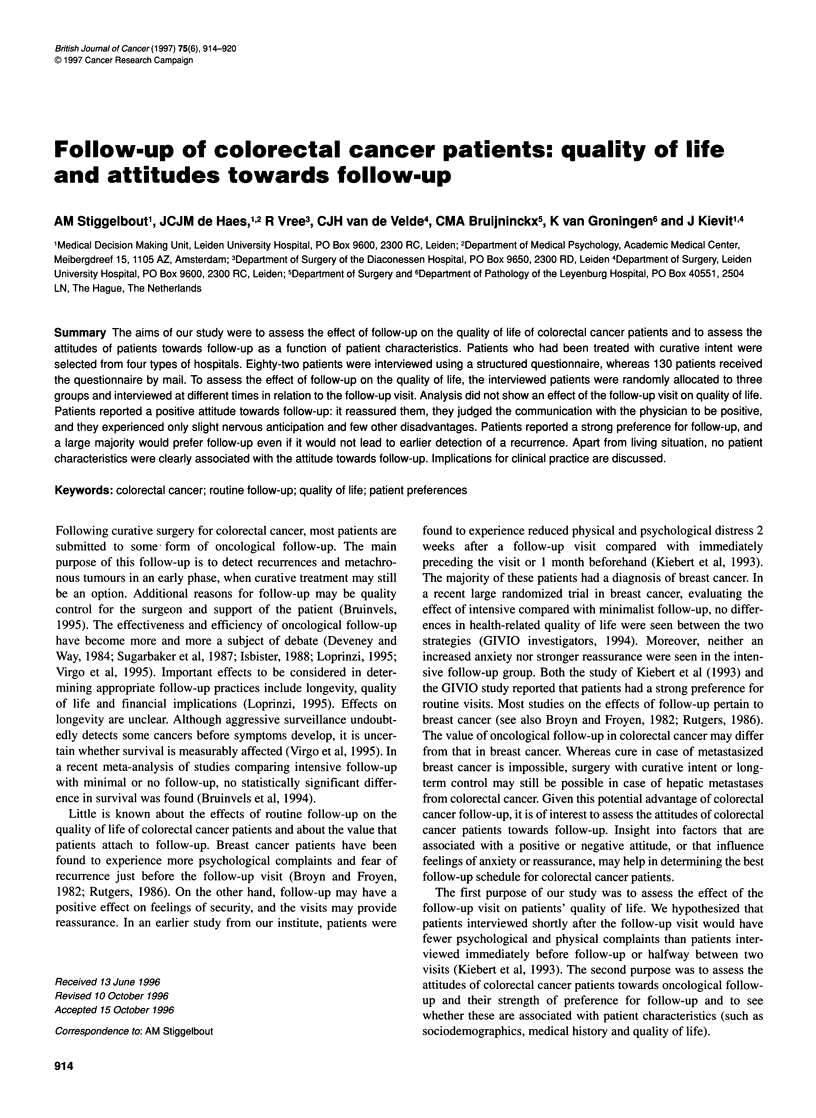
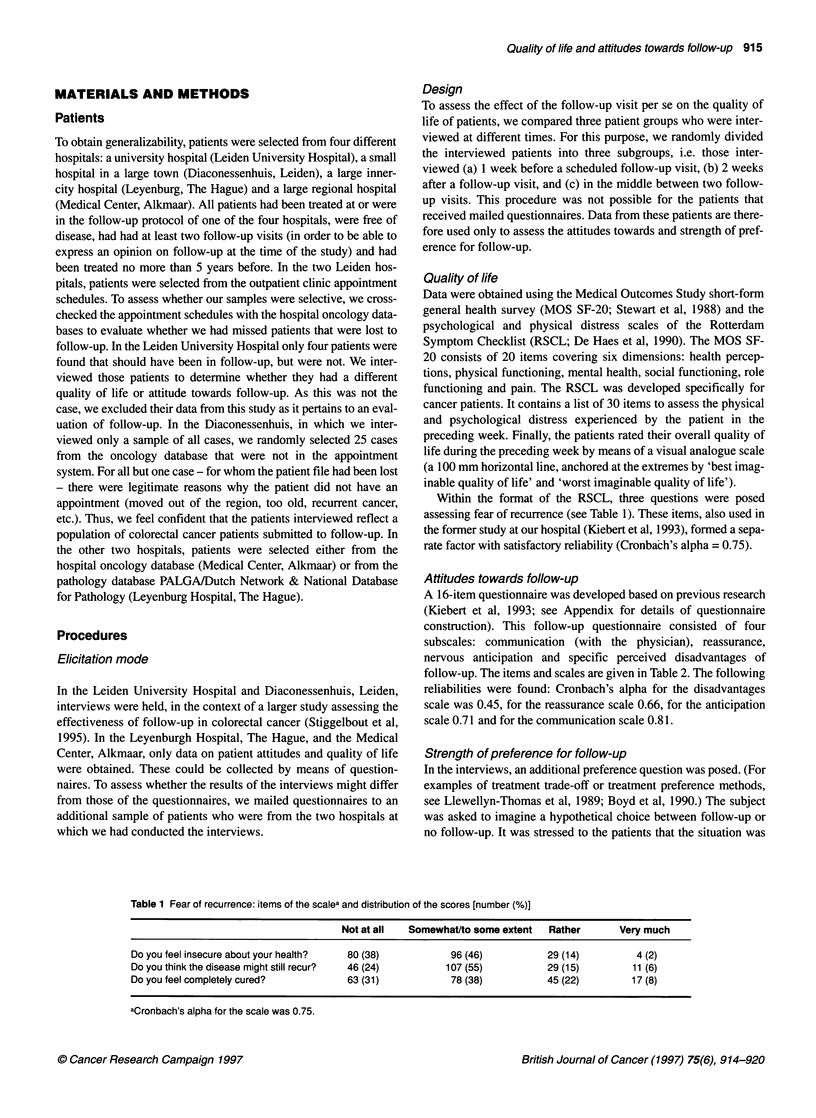
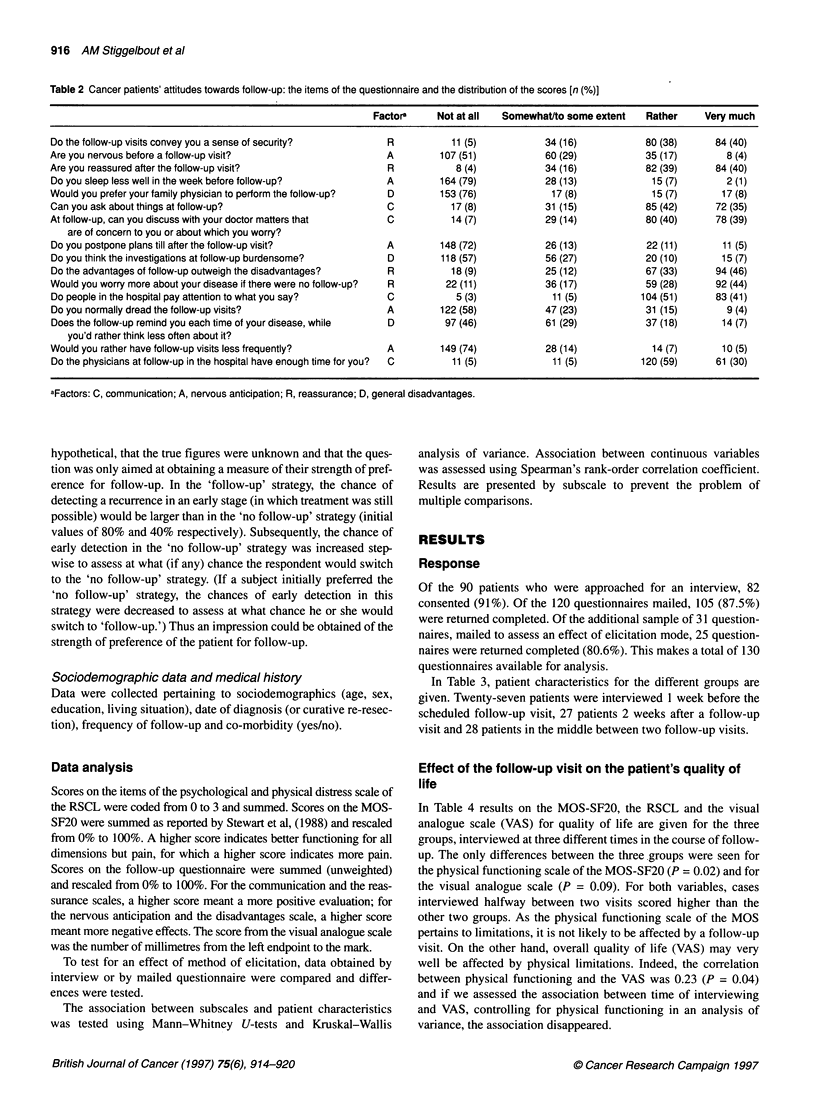
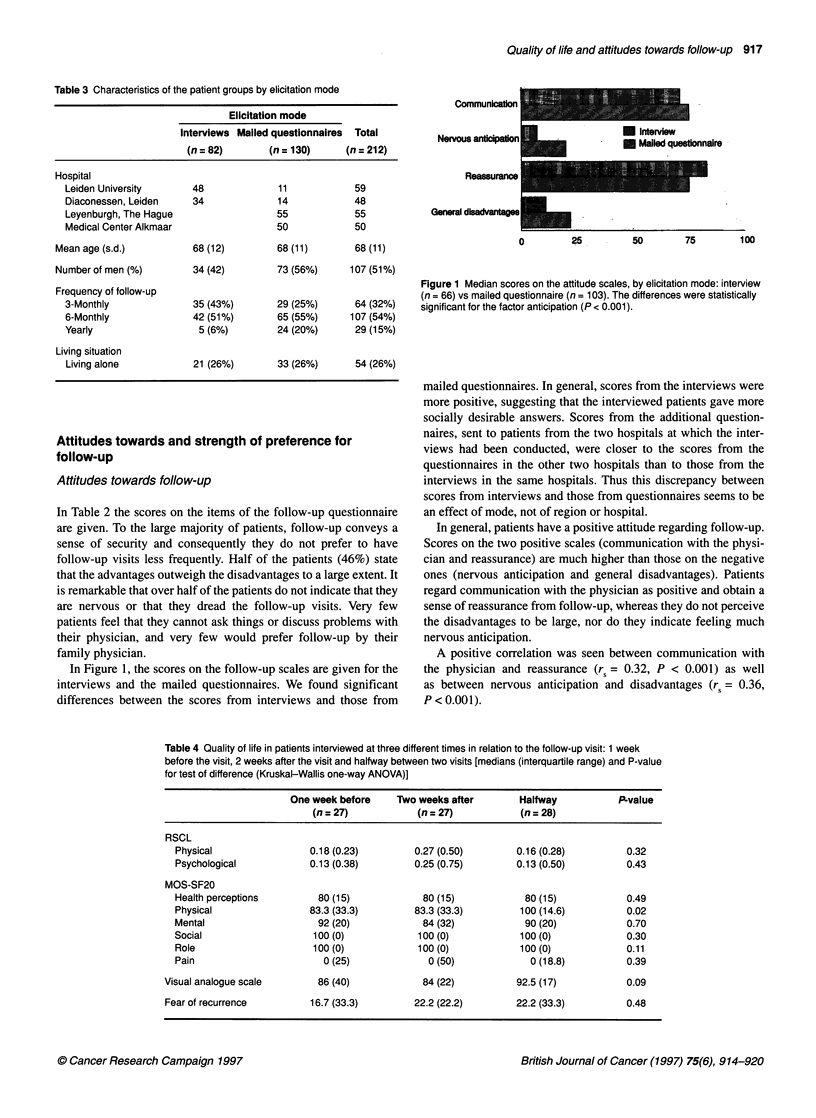
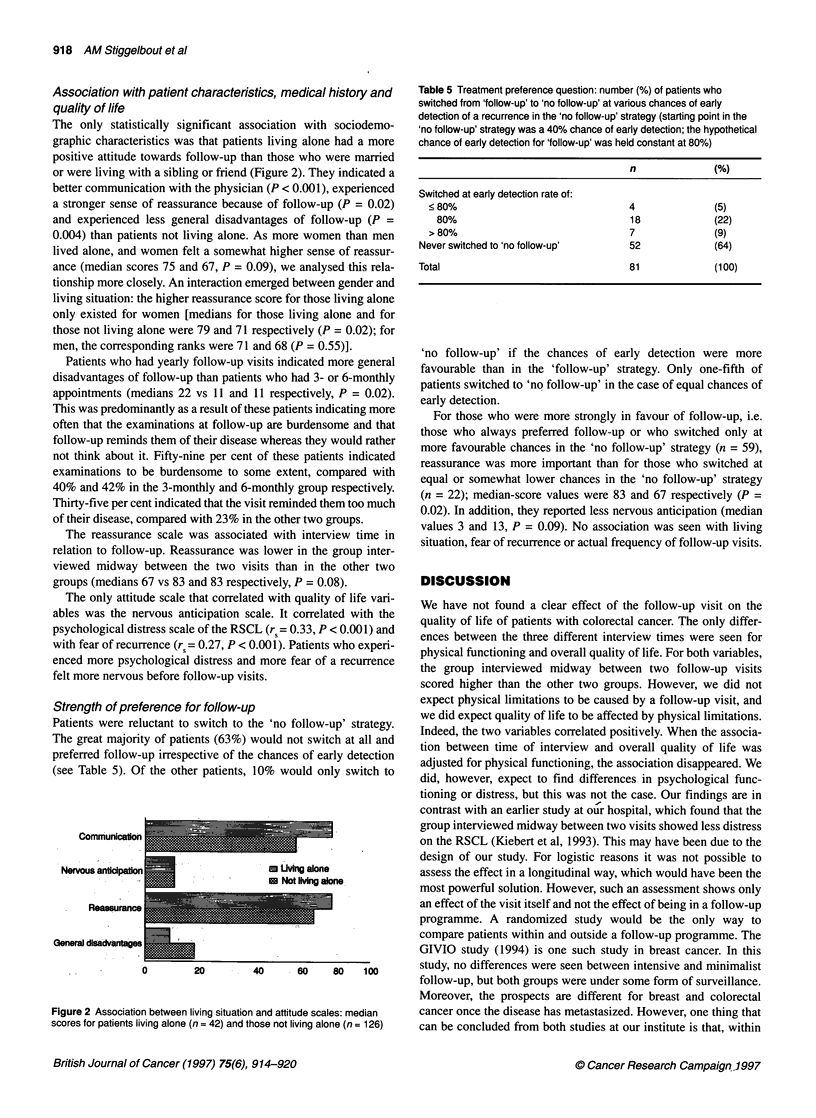
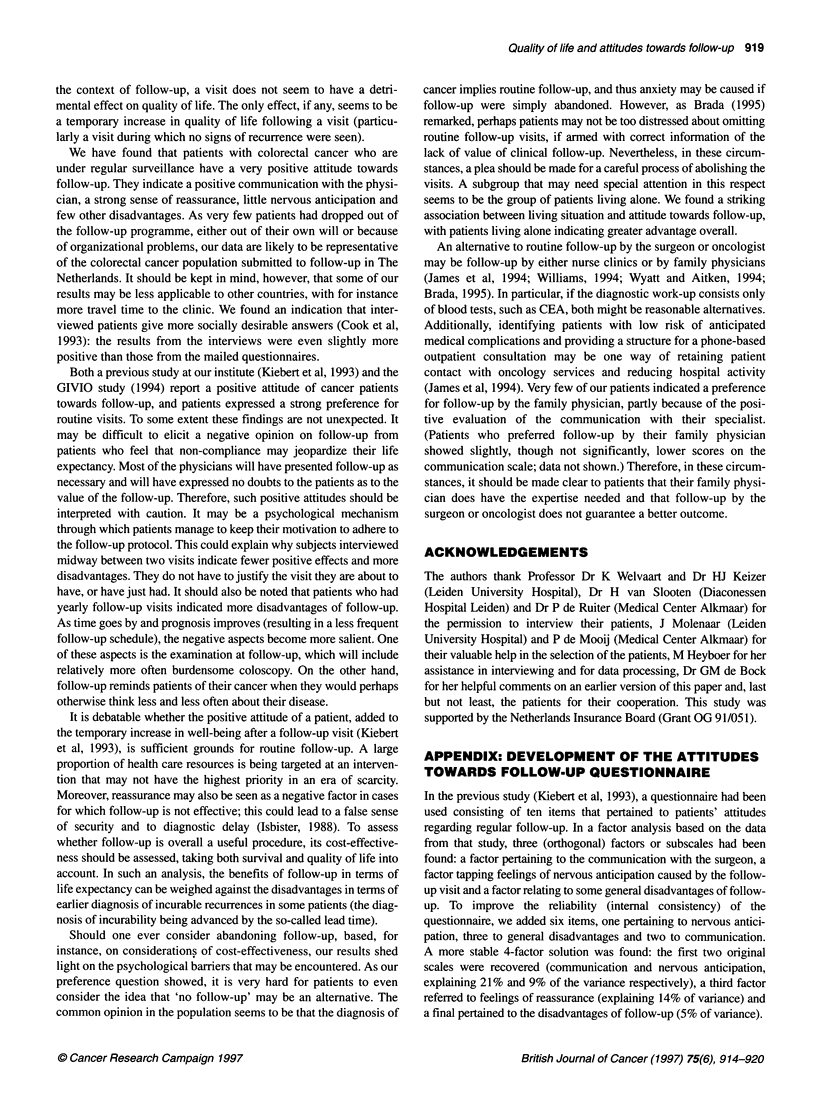
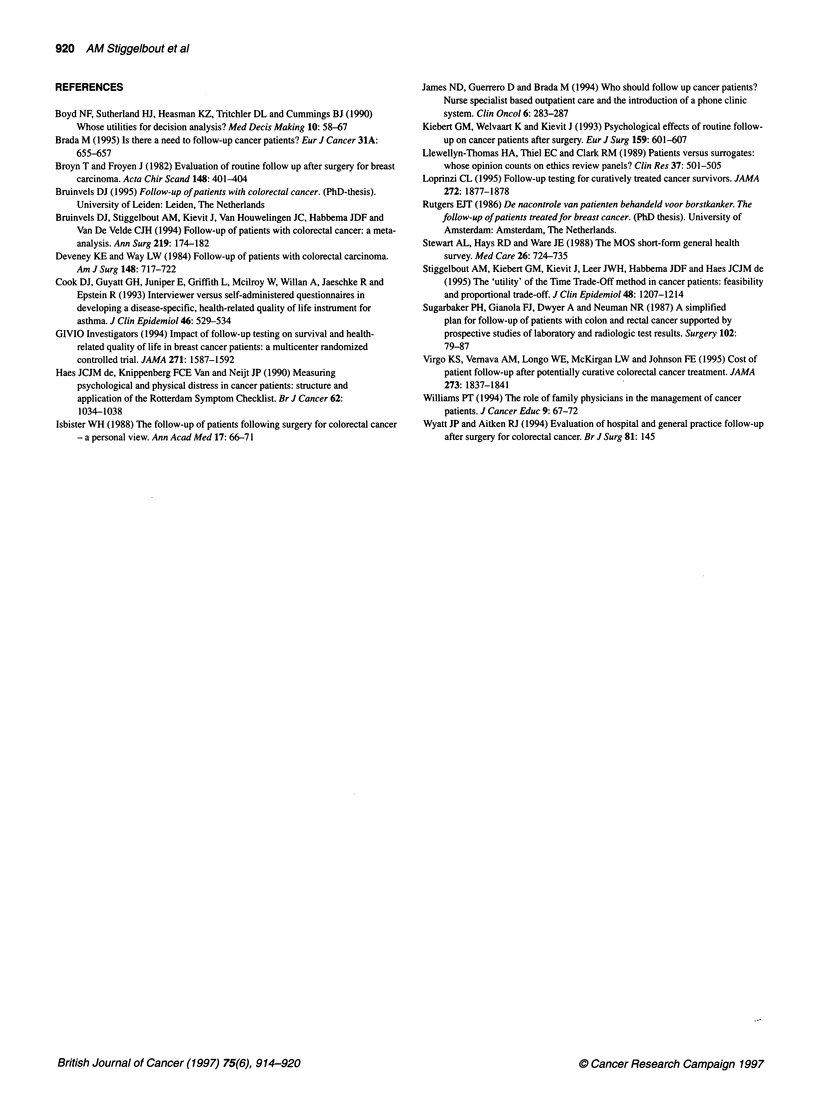
Selected References
These references are in PubMed. This may not be the complete list of references from this article.
- Boyd N. F., Sutherland H. J., Heasman K. Z., Tritchler D. L., Cummings B. J. Whose utilities for decision analysis? Med Decis Making. 1990 Jan-Mar;10(1):58–67. doi: 10.1177/0272989X9001000109. [DOI] [PubMed] [Google Scholar]
- Brada M. Is there a need to follow-up cancer patients? Eur J Cancer. 1995;31A(5):655–657. doi: 10.1016/0959-8049(95)00079-x. [DOI] [PubMed] [Google Scholar]
- Bruinvels D. J., Stiggelbout A. M., Kievit J., van Houwelingen H. C., Habbema J. D., van de Velde C. J. Follow-up of patients with colorectal cancer. A meta-analysis. Ann Surg. 1994 Feb;219(2):174–182. doi: 10.1097/00000658-199402000-00009. [DOI] [PMC free article] [PubMed] [Google Scholar]
- Brøyn T., Frøyen J. Evaluation of routine follow-up after surgery for breast carcinoma. Acta Chir Scand. 1982;148(5):401–404. [PubMed] [Google Scholar]
- Cook D. J., Guyatt G. H., Juniper E., Griffith L., McIlroy W., Willan A., Jaeschke R., Epstein R. Interviewer versus self-administered questionnaires in developing a disease-specific, health-related quality of life instrument for asthma. J Clin Epidemiol. 1993 Jun;46(6):529–534. doi: 10.1016/0895-4356(93)90125-k. [DOI] [PubMed] [Google Scholar]
- Deveney K. E., Way L. W. Follow-up of patients with colorectal cancer. Am J Surg. 1984 Dec;148(6):717–722. doi: 10.1016/0002-9610(84)90423-9. [DOI] [PubMed] [Google Scholar]
- Isbister W. H. The follow-up of patients following surgery for colorectal cancer--a personal view. Ann Acad Med Singapore. 1988 Jan;17(1):66–71. [PubMed] [Google Scholar]
- James N. D., Guerrero D., Brada M. Who should follow up cancer patients? Nurse specialist based outpatient care and the introduction of a phone clinic system. Clin Oncol (R Coll Radiol) 1994;6(5):283–287. doi: 10.1016/s0936-6555(05)80267-5. [DOI] [PubMed] [Google Scholar]
- Kiebert G. M., Welvaart K., Kievit J. Psychological effects of routine follow up on cancer patients after surgery. Eur J Surg. 1993 Nov-Dec;159(11-12):601–607. [PubMed] [Google Scholar]
- Llewellyn-Thomas H. A., Thiel E. C., Clark R. M. Patients versus surrogates: whose opinion counts on ethics review panels? Clin Res. 1989 Sep;37(3):501–505. [PubMed] [Google Scholar]
- Loprinzi C. L. Follow-up testing for curatively treated cancer survivors. What to do? JAMA. 1995 Jun 21;273(23):1877–1878. [PubMed] [Google Scholar]
- Stewart A. L., Hays R. D., Ware J. E., Jr The MOS short-form general health survey. Reliability and validity in a patient population. Med Care. 1988 Jul;26(7):724–735. doi: 10.1097/00005650-198807000-00007. [DOI] [PubMed] [Google Scholar]
- Stiggelbout A. M., Kiebert G. M., Kievit J., Leer J. W., Habbema J. D., De Haes J. C. The "utility" of the Time Trade-Off method in cancer patients: feasibility and proportional Trade-Off. J Clin Epidemiol. 1995 Oct;48(10):1207–1214. doi: 10.1016/0895-4356(95)00011-r. [DOI] [PubMed] [Google Scholar]
- Sugarbaker P. H., Gianola F. J., Dwyer A., Neuman N. R. A simplified plan for follow-up of patients with colon and rectal cancer supported by prospective studies of laboratory and radiologic test results. Surgery. 1987 Jul;102(1):79–87. [PubMed] [Google Scholar]
- Virgo K. S., Vernava A. M., Longo W. E., McKirgan L. W., Johnson F. E. Cost of patient follow-up after potentially curative colorectal cancer treatment. JAMA. 1995 Jun 21;273(23):1837–1841. [PubMed] [Google Scholar]
- Williams P. T. The role of family physicians in the management of cancer patients. J Cancer Educ. 1994 Summer;9(2):67–72. doi: 10.1080/08858199409528273. [DOI] [PubMed] [Google Scholar]
- Wyatt J. P., Aitken R. J. Evaluation of hospital and general practice follow-up after surgery for colorectal cancer. Br J Surg. 1994 Jan;81(1):145–145. doi: 10.1002/bjs.1800810153. [DOI] [PubMed] [Google Scholar]
- de Haes J. C., van Knippenberg F. C., Neijt J. P. Measuring psychological and physical distress in cancer patients: structure and application of the Rotterdam Symptom Checklist. Br J Cancer. 1990 Dec;62(6):1034–1038. doi: 10.1038/bjc.1990.434. [DOI] [PMC free article] [PubMed] [Google Scholar]


